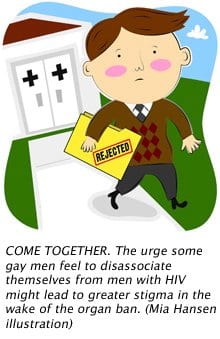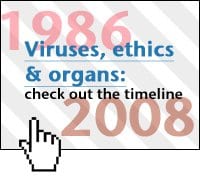Gay men aren’t the only people officially discouraged from donating organs since Health Canada quietly enacted its controversial policy last December. Sex workers, prisoners and IV drug users are also subject to the ban.
But you’d never know about these prohibited groups from the flood of mainstream-media headlines. “Sexually active gay men no longer allowed to donate organs,” said CBC.ca when the story broke on Jan 7 and most queer press coverage has barely mentioned other affected communities.
Conversations among gay men have been characterized by anger and a sense of righteous indignation over a policy most consider problematic. But sometimes the discussions have a subtle subtext: “Just because I’m gay doesn’t mean I automatically have AIDS. I’m not like the irresponsible gay men who get HIV. And why am I being lumped in with whores, druggies and junkies?”
University of Toronto student Lawrence Lucas started an online petition supporting the right of sexually active gay men to donate organs. Endorsed by Egale Canada and promoted via social networking site Facebook, the petition has garnered more than 3,000 signatures. Many signatories decry any association between gay men and others targeted by the policy.
“Just because I’m a sexually active gay male does not mean that I have HIV or live a high-risk lifestyle. Ninety percent of us are educated and normal,” commented Clayton from Edmonton. “I don’t understand how they can put IV drug users in the same sentence with gay men. This is offensive,” wrote Nicholas from Anjou.
What does it mean when gay men distance ourselves from drug users or sex professionals? How does the response reflect the changing social status of gay men or attitudes toward people with HIV? And why is no one asking what the other affected groups have to say about the ban?
Twenty-five years ago gay men were just as stigmatized as other groups the media and medical establishments deemed high risk. In the post-Will and Grace era gay men have successfully fought for greater social acceptance, while others still lag behind.
Amy Lebovitch, a sex worker and member of Sex Professionals of Canada, is not surprised the media have focused exclusively on gay men. “They’ve made greater progress on human rights,” she says. “Sex workers have a long way to go in terms of getting basic respect from everyone else.”
Lebovitch says it’s ironic sex workers are targeted by the ban. “Because of the nature of our work we’re more conscious than most people about sexual safety and health. We get tested and provide education to our clients.”
She thinks the policy will increase sex-work stigma. “If sex workers can’t donate organs, this reinforces the misguided idea there’s something wrong with us.”
Connor McCollum of the Prisoners’ HIV/AIDS Support/Action Network says prisoners are in fact at greater risk of contracting HIV because of the unsafe conditions in which they’re forced to live.
“Correctional services deny people access to harm-reduction materials — needle exchange, safer-tattooing equipment. Even the things they’re supposed to supply — condoms, lube, dental dams, bleach — they don’t.”
But that doesn’t justify the outright ban, he says. Prisoners are aware of the new restrictions and upset about them, says McCollum. “People in prison with Hepatitis C need liver transplants — but other prisoners are forbidden to share a portion of their liver with a friend in need because of the Health Canada policy.”
Few queer advocates have spoken out about prison issues in the context of fighting the ban, though. “The gay mainstream is more acceptable to the status quo” than more-stigmatized groups, says McCollum. “Some queers see elements of our own community as unsavory.
“It’s a panic response — not wanting to be lumped in with sex workers or prisoners, even though many of them are queer,” he says. “The irony is that gay men are fighting against the stereotype that HIV is only a gay disease, but want to separate themselves from people in their own community who are seen as diseased.”
The urge some queer men feel to disassociate themselves from men with HIV might lead to greater stigma in the wake of the organ ban. “Some negative gay men believe those who have HIV deserve it,” says Murray Jose, executive director of the Toronto People with AIDS Foundation. “Internalized homophobia, other discrimination in the gay community, such as racism — all those things impact our tendencies to judge others.
“For example their own feelings of discomfort around being able to enjoy sex freely may lead some to perceive that people with HIV have more sex than they do, imagining the amount of sex led to their infection.”
People with HIV/AIDS have their own organ transplant issues, Jose says. “Many people who’ve been on meds for a long time, their organs start to shut down.
“Long-term survivors experience kidney failure, cardiac arrest, heart disease, liver disorders — and face barriers left, right and centre from the healthcare establishment. Oftentimes they are denied transplants, told, ‘It’s not worth it, you’re going to die anyway.'”
It’s common for surgeons to refuse to give transplants to people with HIV, he says.
“There’s no clear policy on where we fit into priorities for organ transplants and by eliminating gay men and other communities when there’s already an organ shortage it’s even more unlikely people with HIV who need organs will get them. It’s a vicious circle.”
Jose calls for a unified approach involving all affected communities. “Let’s look at this issue holistically,” he says.


 Why you can trust Xtra
Why you can trust Xtra


